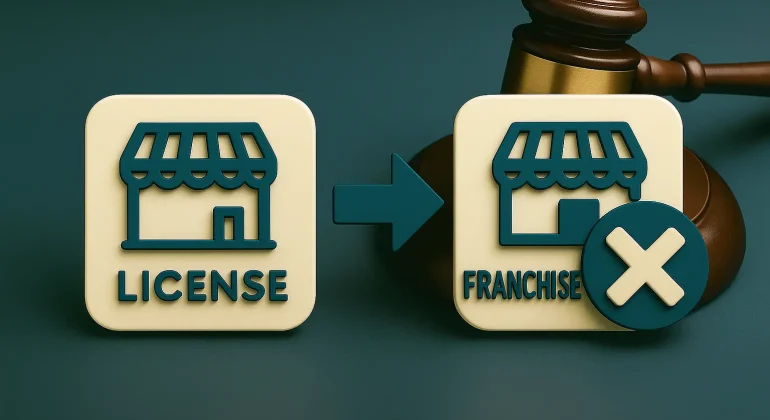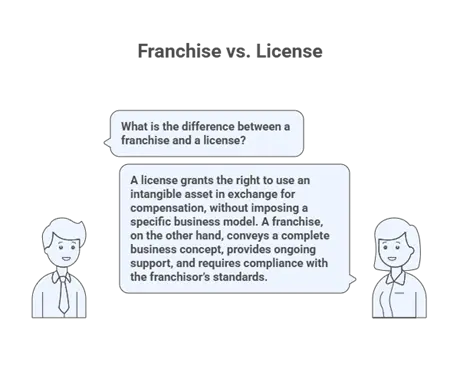Sommaire
Introduction
In an increasingly complex legal environment, a trademark license agreement may be reclassified as a franchise, leading to significant legal and financial consequences. This situation, referred to as an “accidental franchise,” often arises when businesses expand internationally without anticipating the specific legal obligations that apply to franchises. This article highlights the risks, red flags, and best practices to secure licensing agreements.
What is an accidental franchise?
An accidental franchise occurs when a company believes it is granting a simple trademark license, but the contractual provisions and actual practices meet the legal criteria of a franchise.
Under French law, a franchise generally implies:
- The provision of a trademark or distinctive sign.
- Payment of remuneration by the franchisee.
- The transfer of substantial know-how and ongoing assistance.
By contrast, a trademark license, is limited to authorizing the use of the sign under quality control, with exploitation restricted to a given territory, without any operational supervision of the licensee. The line is subtle but decisive.
Legal and financial risks of reclassification
Reclassifying a license as a franchise may result in:
- Regulatory sanctions: nullity of the contract or fines in the absence of pre-contractual disclosure documents or required formalities.
- Civil liability: claims for damages by franchisees, reimbursement of amounts paid.
- Tax risks: reassessments concerning the nature of royalties.
- Damage to brand image: publicity of disputes and loss of credibility.
Illustrative example: A French fashion company imposes a uniform store design and mandatory marketing strategy on its licensees. The court reclassifies the agreements as franchise contracts, leading to their nullification and compensation to franchisees.
Warning signs in licensing agreements
a) Excessive control over the licensee
Clauses imposing management methods, pricing policies, or detailed operating manuals.
b) Fees resembling franchise entry fees
Upfront payments for training, advertising, or assistance.
c) Rigid territorial exclusivity
Agreements tied to strict marketing obligations.
d) Continuous mandatory assistance
Permanent transfer of know-how and ongoing supervision.
Best practices to secure agreements
- Anticipate local laws: review franchise legislation before drafting a license agreement.
- Limit assistance: focus only on trademark use and compliance with quality standards.
- Clear drafting: specify financial obligations to avoid assimilation with franchise entry fees.
- Rely on specialized counsel: intellectual property and franchise lawyers can adapt contracts to local requirements.
- Regular audits: periodically review agreements to ensure compliance with evolving regulations.
Case study: A French cosmetics start-up structured its foreign licensing agreements with specialized legal advice. By limiting obligations to quality control, it avoided reclassification as a franchise and safeguarded its business model.
Conclusion
Avoiding the accidental franchise is a strategic issue for protecting brand value and ensuring the legal security of licensing agreements. Increased vigilance and carefully drafted contracts can prevent disputes and optimize commercial expansion.
Key takeaway: clearly distinguishing between a license and a franchise is essential to secure operations and preserve reputation.
Dreyfus Law firm assists its clients in managing complex intellectual property cases, offering personalized advice and comprehensive operational support for the complete protection of intellectual property.
Dreyfus Law firm is partnered with a global network of lawyers specializing in intellectual property.
Nathalie Dreyfus with the assistance of the entire Dreyfus team.
FAQ
What distinguishes a franchise from a trademark license?
A franchise involves a complete business concept with assistance and control, while a license is limited to the use of a trademark under quality control.
What is an “accidental franchise” in practice?
An accidental franchise occurs when a license agreement is reclassified as a franchise due to failure to comply with legal formalities.
What are the main risks for the company in case of reclassification?
The risks include the nullity of the contract, financial penalties, and the liability of the licensor.
What obligations do franchisors have in France?
Franchisors must provide the pre-contractual disclosure document (DIP, under the Doubin Law), transfer know-how, and ensure ongoing assistance.
What warning signs should be identified in a contract?
Overly detailed operating obligations, excessive control, or the existence of imposed confidential know-how.
How can an operating manual be prevented from being treated as franchise know-how?
By limiting the manual to quality standards without conveying structured confidential know-how.


